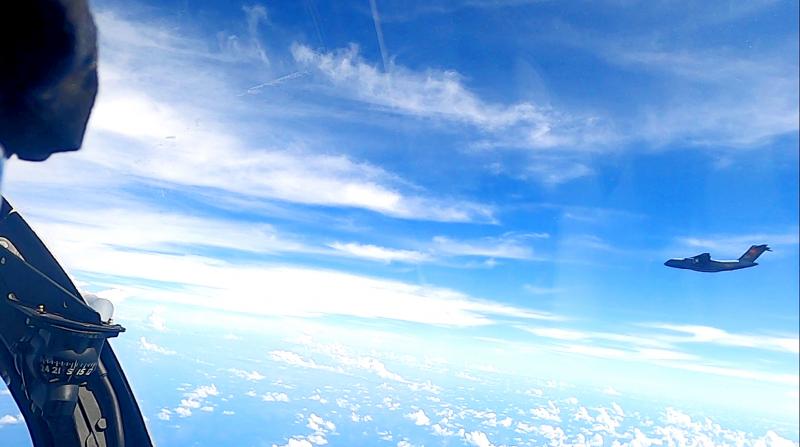The Malaysian government plans to issue a diplomatic protest against an “intrusion” by 16 Chinese military aircraft into its airspace, the foreign minister said.
Malaysian Minister of Foreign Affairs Hishammuddin Hussein late on Tuesday said that he would summon the Chinese ambassador to explain “this breach of the Malaysian airspace and sovereignty.”
The Chinese embassy in Malaysia denied that the planes breached Malaysia’s airspace.

Photo: Royal Malaysian Air Force via Reuters
Malaysia’s air force said that its radar picked up the Chinese warplanes on Monday near the Malaysian-administered Luconia Shoals, a rich fishing ground in the disputed South China Sea.
The Chinese planes then moved nearly 60 nautical miles (110km) off the coast of Sarawak on Borneo island, it said.
After attempts to contact the aircraft failed, the air force said it sent its fighter jets to identify them.
They were Ilyushin Il-76 and Xian Y-20 strategic transporters, flying at an altitude of 7,000m to 8,000m — altitude typically used by commercial flights, it said.
Malaysia called the incident a “serious threat to national sovereignty and flight safety.”
“Malaysia’s stand is clear — having friendly diplomatic relations with any countries does not mean that we will compromise our national security,” Hishammuddin said in a statement.
He said that he would relay Malaysia’s serious concern about the matter to his Chinese counterpart.
The Chinese embassy defended the activity, saying that its military planes did not breach Malaysia’s airspace and had exercised freedom of overflight in the area.
They were carrying out routine flight training and did not target any country, the embassy said in a statement.
During the training, the Chinese military aircraft strictly abided by international law and did not enter the territorial airspace of any other country, it said.
China claims almost the entire South China Sea on historic grounds. Taiwan, Brunei, Malaysia, the Philippines and Vietnam also have overlapping claims, and tensions have increased since China built several islands and turned them into military outposts.
The strategically important area straddles some of the world’s busiest sea lanes. It is also rich in fisheries, and might hold underground oil and natural gas reserves.
Malaysia says that Chinese coast guard and navy ships intruded in its waters in the South China Sea 89 times from 2016 to 2019.
Malaysia has filed six diplomatic protests with China, including one in 2017 in response to a Chinese note asserting its claim to the South Luconia Shoals (Nankang Shoal, 南康暗沙).

Right-wing political scientist Laura Fernandez on Sunday won Costa Rica’s presidential election by a landslide, after promising to crack down on rising violence linked to the cocaine trade. Fernandez’s nearest rival, economist Alvaro Ramos, conceded defeat as results showed the ruling party far exceeding the threshold of 40 percent needed to avoid a runoff. With 94 percent of polling stations counted, the political heir of outgoing Costa Rican President Rodrigo Chaves had captured 48.3 percent of the vote compared with Ramos’ 33.4 percent, the Supreme Electoral Tribunal said. As soon as the first results were announced, members of Fernandez’s Sovereign People’s Party

MORE RESPONSIBILITY: Draftees would be expected to fight alongside professional soldiers, likely requiring the transformation of some training brigades into combat units The armed forces are to start incorporating new conscripts into combined arms brigades this year to enhance combat readiness, the Executive Yuan’s latest policy report said. The new policy would affect Taiwanese men entering the military for their compulsory service, which was extended to one year under reforms by then-president Tsai Ing-wen (蔡英文) in 2022. The conscripts would be trained to operate machine guns, uncrewed aerial vehicles, anti-tank guided missile launchers and Stinger air defense systems, the report said, adding that the basic training would be lengthened to eight weeks. After basic training, conscripts would be sorted into infantry battalions that would take

GROWING AMBITIONS: The scale and tempo of the operations show that the Strait has become the core theater for China to expand its security interests, the report said Chinese military aircraft incursions around Taiwan have surged nearly 15-fold over the past five years, according to a report released yesterday by the Democratic Progressive Party’s (DPP) Department of China Affairs. Sorties in the Taiwan Strait were previously irregular, totaling 380 in 2020, but have since evolved into routine operations, the report showed. “This demonstrates that the Taiwan Strait has become both the starting point and testing ground for Beijing’s expansionist ambitions,” it said. Driven by military expansionism, China is systematically pursuing actions aimed at altering the regional “status quo,” the department said, adding that Taiwan represents the most critical link in China’s

‘REALLY PROUD’: Nvidia would not be possible without Taiwan, Huang said, adding that TSMC would be increasing its capacity by 100 percent Nvidia Corp CEO Jensen Huang (黃仁勳) on Saturday praised and lightly cajoled his major Taiwanese suppliers to produce more to help power strong demand for artificial intelligence (AI), capping a visit to the country of his birth, where he has been mobbed by adoring fans at every step. Speaking at an impromptu press conference in the rain outside a Taipei restaurant, where he had hosted suppliers for a “trillion-dollar dinner,” named after the market capitalization of those firms attending, Huang said this would be another good year for business. “TSMC needs to work very hard this year because I need a lot